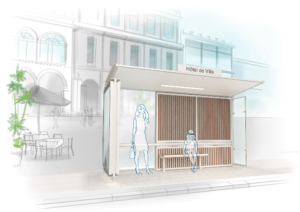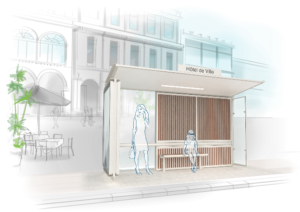Russ Curry, Ministry of New Media
JCDecaux SA (Euronext Paris: DEC), the number one outdoor advertising company worldwide, has developed and is now offering local authorities its new-generation Natural Cooling bus shelter
 Summers have seemingly become hotter in recent years. According to the World Meteorological Organisation, 2019 was the second hottest year on record after 2016. The WMO also noted that the average temperature between 2015 and 2019 was 1.1°C higher than in the fifty years between 1850 and 1900.
Summers have seemingly become hotter in recent years. According to the World Meteorological Organisation, 2019 was the second hottest year on record after 2016. The WMO also noted that the average temperature between 2015 and 2019 was 1.1°C higher than in the fifty years between 1850 and 1900.
This rise in temperature has widespread consequences and leads to the formation of urban heat islands, which have an impact on cities and on the health and well-being of their inhabitants.
To help address this problem, a range of initiatives to create cooling areas in the city during the summer are currently being trialled. JCDecaux has developed an innovative patented solution to cool off people in its bus shelters, providing a sense of comfort and well-being during periods of intense heat.
Jean-Charles Decaux, Chairman of the Executive Board and Co-Chief Executive Officer of JCDecaux, told us “JCDecaux is a partner to cities around the world. We are continuously innovating to develop products and services to improve everyday urban life and to pursue increased sustainability. Our R&D team has designed a new generation of bus shelters inspired by nature. Following the Filtreo® bus shelter, Natural Cooling will improve quality of urban life during increasingly frequent heatwaves. The bus shelter’s evaporative cooling system is a practical solution for the comfort of city dwellers.”
JCDecaux’s R&D department took its inspiration from a natural, age-old process: evaporative cooling. Hot air entering the Natural Cooling shelter flows through a wet honeycomb-shaped panel. It is then cooled naturally by evaporation. This solution includes a tank to gather rainwater from the roof and a system to pipe the water to the cooling module. If there is no wind, fans blow the hot air through the wall. The cool air is then blown towards users waiting in the shelter. Solar panels on the roof produce the energy required. The real-time control system detects weather conditions and human presence in the shelter in order to function efficiently and only when required.
 Combining solar energy with rainwater harvesting, this self-contained solution avoids the use of air conditioning with its high energy consumption. Unlike misting, the evaporation process presents no health risks since it does not create micro-droplets.
Combining solar energy with rainwater harvesting, this self-contained solution avoids the use of air conditioning with its high energy consumption. Unlike misting, the evaporation process presents no health risks since it does not create micro-droplets.
Natural Cooling acts as a sort of urban cooling oasis for the comfort and well-being of passengers. This effect is further enhanced by the use of untreated wood and light colours. The pergola-inspired design is friendly and welcoming. Passers-by are encouraged to step inside the shady interior and take advantage of the seats, which are inspired by interior furnishings.
Tests in a heat chamber have confirmed the system’s ability to reduce the temperature by between 4°C and 7°C to 36 degrees and 50% humidity. Natural Cooling will soon be tested in real conditions.

Follow DailyDOOH